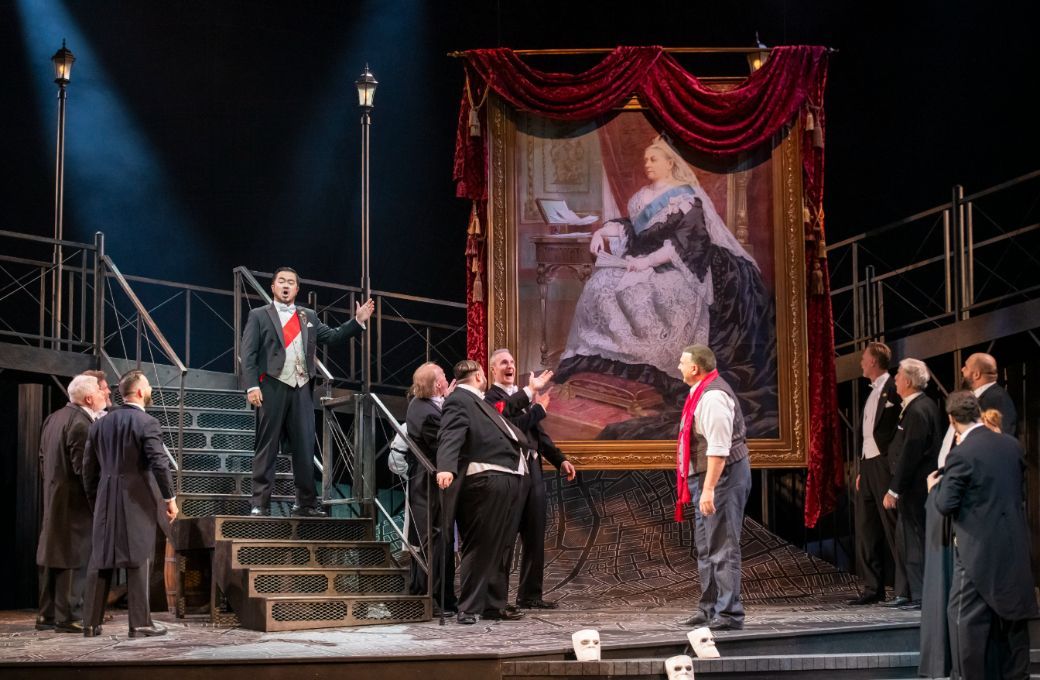Authoritarian rulers, licentious royals and a society descending into violence and vengeance: Verdi’s Rigoletto may feel uncomfortably relevant to anyone who reads the news. It can be tricky to make Verdi’s old chestnut feel fresh but Vancouver Opera’s new production, helped along by some stellar vocal performances, does the trick.

Glynis Leyshon’s production highlights the different ways patriarchy manifests itself in society: the entitled masculinity of the Duke’s court; Sparafucile’s violent domination of Maddalena; and Rigoletto’s overprotective control over his daughter. In this world, the few moments of agency women have – Giovanna accepting a bribe, Maddalena convincing her brother to spare the Duke, Gilda’s sacrifice – ultimately lead to tragedy. Leyshon updates the action to Victorian-era London, the Duke’s court transposed to a member’s club and Sparafucile’s inn a seedy pub by the Thames. It mostly works. James Rotondo’s unit set is efficient and attractive, if too brightly lit to evoke London by night. The one misstep is the giant portrait of Queen Victoria that dominates the opening scene, the Duke’s paean to the fickleness of women drawing unintentional titters.
Victorian London aside, Leyshon’s production is a mostly traditional affair. It’s a good thing Michael Chioldi is such an experienced Rigoletto, as one of the Met’s go-to baritones in the role. He brings a specificity to the text and acting, with admirable diction and physical fearlessness. His baritone is the real deal: a muscular, dark sound with ringing high notes. He was most effective in his outbursts, lashing out at the courtiers with a sneer. He lacks the ideal legato for “Cortigiani”, but he phrased smartly and ramped up the tension for the moments that count.
As the amoral Duke, Yongzhao Yu brought a bright, assertive tenor. He has enough flexibility to navigate the turns in “Questa o quella” and a great upper register, but his attempts to sound more Italianate through adding sobs and sighs often muffled his projection. In Leyshon’s world the Duke is no elegant aristocrat, but Yu didn’t pull off the brutality of the role either. He was at his best in the quartet, opposite Emma Parkinson’s charming Maddalena. Parkinson has a wonderfully polished lyric mezzo, with an alluring timbre and intelligent phrasing. Her voice and demeanor have an innate elegance, but she pulled off Maddalena’s Victorian streetwalker garb with aplomb.
It’s a luxury to have Nathan Berg as Sparafucile after an illustrious career as William Christie’s bass-baritone of choice. Thirty years later, the voice has held up remarkably well and even if his essentially lyric voice isn’t a natural fit for the role, he’s a canny enough musician to navigate its highs and lows. Among the smaller roles, Mihnea Nitu’s burnished sound and charismatic presence as Marullo marked him as a name to watch.
But the star of the show was Sarah Dufresne’s Gilda. The Canadian soprano has gone from strength to strength during her time as a Jette Parker Artist at The Royal Opera and her Gilda demonstrates that she’s fully ready for leading roles. Her bright, girlish soprano recalls the French lyric-coloraturas of the past, with neat coloratura and an attractively shimmering vibrato. She was at her best in the bell-like staccati in the Act 1 duet with Rigoletto and “Caro nome”, her aria sung with the right mix of innocence and desire.
But she was also effective in the more dramatic later acts, with lovely phrasing in “Tutte le feste” and showing off a well-projected lower register in the trio. She didn’t miss an opportunity to show off her high notes, taking the higher options at the end of “Si vendetta”, the quartet and the trio, but these had less brilliance than the rest of her voice — I suspect she’ll soon be moving into more lyric repertoire.
Conductor Jacques Lacombe kept things moving swiftly, maintaining the musical and dramatic tension while allowing his cast the necessary space to shine. The Vancouver Opera orchestra and chorus compensated for their relatively small numbers with sheer enthusiasm, providing a satisfying racket in the thunderstorm.


